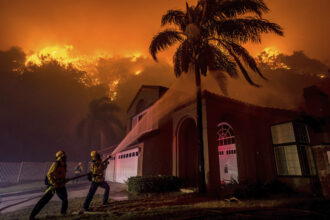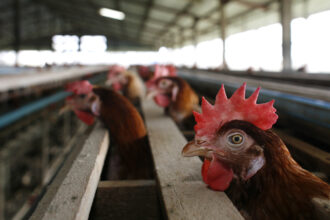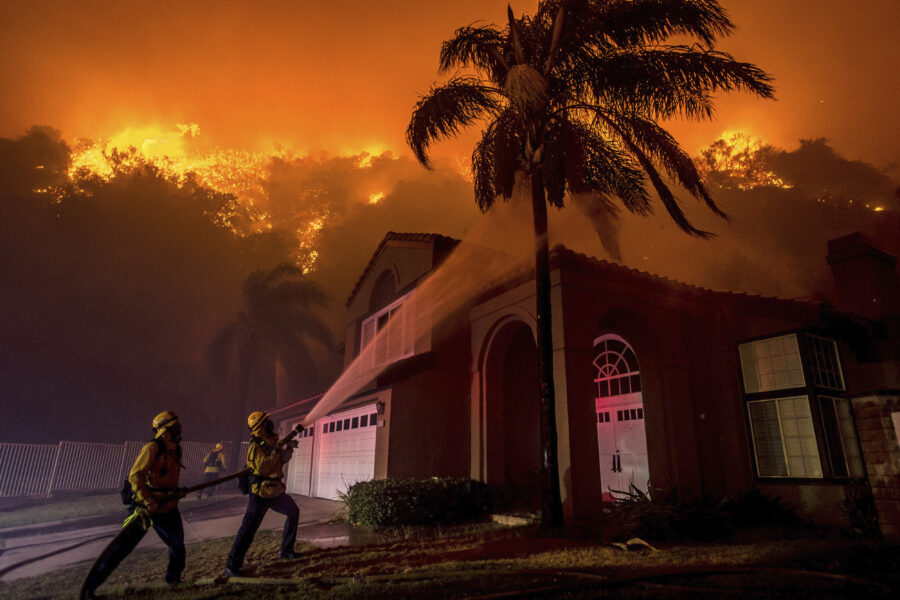If humanity continues producing and consuming food as it does today, those food systems alone will drive Earth’s average temperature up by nearly 1 degree Celsius by the end of the century, scientists warned in a new study. It’s the latest research to suggest that slashing methane emissions from the agriculture sector—particularly from meat and dairy production—remains one of the most impactful ways to slow climate change.
Climate experts have long said tackling agricultural emissions, estimated to make up roughly 15 percent of Earth’s total production of greenhouse gases, is necessary to avoid catastrophic warming in the coming decades. But the new study, published Monday in the journal Nature Climate Change, specifically highlights the outsized role methane plays among food-related emissions.
The potent greenhouse gas—capable of warming the planet roughly 80 times more effectively than carbon dioxide over a 20-year period—is also emitted by fossil fuels and other industrial operations, as well as through natural processes like the decay of vegetation.
In fact, methane has accounted for roughly 30 percent of global warming since pre-industrial times and is proliferating faster than at any other time since record keeping began in the 1980s, according to the United Nations. The odorless gas, which is the main ingredient in the natural gas that heats buildings and powers electrical grids, is also the primary contributor to the formation of ground-level ozone, a hazardous air pollutant and greenhouse gas that causes 1 million premature deaths every year.
Because of those factors, as well as the fact that methane breaks down in the atmosphere far faster than carbon dioxide, scientists say that tackling methane emissions isn’t only necessary to keep global climate efforts on track, but it would be the fastest way to curb rising temperatures in the immediate future.
But according to Monday’s study, if the emissions released by the world’s food systems continue at current levels, they’ll cause at least 0.7 degree Celsius of additional warming by 2100, pushing the planet past the 1.5 degree threshold set by the Paris Agreement, even if fossil fuel use is drastically reduced. Methane emissions will account for a whopping 73 percent of that projected warming by mid-century, the study says.
“I think the biggest takeaway that I would want (policymakers) to have is the fact that methane emissions are really dominating the future warming associated with the food sector,” Catherine Ivanovich, a climate scientist at Columbia University and the study’s lead author, told the Associated Press.
The study’s authors looked at the emissions from nearly 100 different types of food and fed that data, along with estimates for population growth in the coming years, into a climate model frequently used by the United Nations for its global warming projections. The analysis found that production of meat, dairy and rice will be responsible for the vast majority of agricultural emissions, with meat accounting for 42 percent, rice 23 percent and dairy 19 percent.
Monday’s study adds to a growing body of evidence that suggests slashing consumption of meat and dairy would be a highly effective way to limit rising emissions.
The researchers said that if everyone limited red meat to a single serving per week, for example, it would prevent nearly a third of the additional warming projected by their model. While that would generally mean less meat consumption in rich nations like the United States, the study’s authors noted, it would also mean an increase in meat consumption for people living in some developing countries. Transitioning agricultural operations to clean energy sources would also reduce the study’s projected warming by almost a fourth, the researchers added.
But many projections point to meat and dairy consumption steadily increasing in the coming years, largely because of the rising global population. The United Nations Food and Agriculture Organization’s most recent outlook, for example, estimates that global meat consumption will increase by 15 percent by 2031.
Agriculture’s environmental impact has taken a larger spotlight in recent years, and climate advocates continue to push for stronger commitments at both a national and global level to reduce food-related emissions—especially methane gas.
One place where significant progress could be made would be at the upcoming COP28 global climate talks being held in November in the United Arab Emirates. As the Guardian reported, only a third of the world’s countries have included policies to cut emissions from agriculture in the climate plans they’ve submitted under the Paris agreement. Advocates are also pushing more nations to sign onto the global methane pledge, under which 111 countries have already promised to collectively reduce methane emissions 30 percent below 2020 levels by the end of the decade.
More Top Climate News
Nations Reach Historic Global Agreement to Protect Ocean Life: For the first time, members of the United Nations have agreed on a unified treaty to protect biodiversity in the high seas—representing a turning point for vast stretches of the planet where conservation has previously been hampered by a confusing patchwork of laws, Patrick Whittle reports for the Associated Press. The global body has failed for decades to update its framework aimed at protecting marine life in waters outside national borders, prompting many scientists to hail the Saturday agreement as a critical milestone in the fight against climate change and biodiversity loss.
The Battle Over Biden’s ‘Woke’ Climate Investing Rule Is Far From Over: Last week, Congress passed a bill aimed at preventing pension fund managers from considering climate change in their investment decisions, part of the Republican’s broader fight against so-called “woke capitalism.” But even with President Joe Biden expected to use his very first veto to block the measure, the GOP war on climate-friendly investing is far from over, Maxine Joselow reports for The Washington Post. That’s because 25 Republican attorneys general have challenged the related Labor Department rule in federal court, where some legal analysts say it will face its most credible threat.
How TikTokers Are Using #StopWillow to Try and Torpedo an Alaskan Oil Drilling Project: Next week, the Biden administration is expected to decide whether it will approve the Willow Project, ConocoPhillips’ controversial oil drilling project in Alaska, which is expected to release 9.2 million metric tons of climate-warming emissions every year—roughly the same amount produced by 2 million cars. But a surge in online activism over the weekend could threaten that proposal, Ella Nilsen reports for CNN. Videos with anti-Willow hashtags like #StopWillow have amassed close to 50 million views in the last week, and online activism has resulted in more than one million letters being written to the White House protesting the project.
Today’s Indicator
9%
That’s how much less meat students ate on average after they listened to just one 50-minute talk about the environmental harms caused by raising and consuming livestock, u003ca href=u0022https://phys.org/news/2023-03-students-ate-meat-years-negative.htmlu0022u003ea new study foundu003c/au003e. The researchers followed the eating habits of 213 students over three years.



















